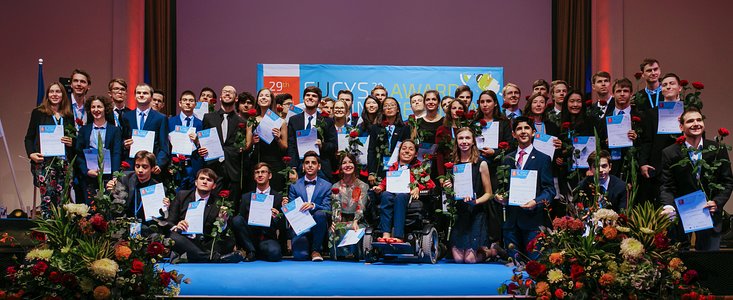Anuncio
Se dan a conocer los ganadores del concurso de la Unión Europea para jóvenes científicos 2017
4 de Octubre de 2017
Se han anunciado los ganadores del prestigioso concurso de la Unión Europea para jóvenes científicos (EUCYS, por sus siglas en inglés). Entre el 22 y el 27 de septiembre de 2017, 146 jóvenes científicos provenientes de 40 países se reunieron en Tallin, Estonia, para participar en el concurso.
Como miembro del EIROforum, el grupo de las ocho principales Organizaciones Intergubernamentales Europeas de Investigación, ESO donó un premio especial para el mejor proyecto en el campo de la astronomía y la física espacial. El joven de 17 años Can Pak de Turquía fue el ganador por su proyecto “Medición de la frecuencia vibratoria de superficie con un diodo láser”. Él recibirá un viaje a los sitios de ESO en Chile, incluyendo visitas al Observatorio Paranal y a las instalaciones de ESO en Santiago. El viaje le brindará una visión única de la vida en los observatorios astronómicos más avanzados del mundo, una experiencia soñada que podría inspirarlo a dedicarse a la astronomía y astrofísica en el futuro. El premio fue presentado por la Dra. Silke Schumacher, Directora de Relaciones Internacionales del EMBL.
En lo que respecta a la competencia, los tres primeros premios, de 7.000 euros cada uno, fueron otorgados a: Karina Movsesjan (18) por el trabajo “Rol de las mutaciones del gen RAD51 en el desarrollo del cáncer”; Adam Jan Alexander Ohnesorge (20) por “Los prisioneros olvidados – prisioneros civiles de la Gran Guerra en Córcega”; y Danish Mahmood (14) por “W.I.N.I.T.S. (Wireless Interconnected Non-Invasive Triage System, en español Sistema de Triaje No Invasivo Interconectado Inalámbrico)”. Los segundos lugares (5.000 euros) fueron otorgados a: Colette Benko (16) por “Terapia Innovadora para el Cáncer Pediátrico: focalización en la epigenética para inducir la diferenciación”; Kamil Humański (18) por “Diversidad Taxonómica del Ordovícico Medio – equinodermos de principios del Silúrico en Siljansringen, Suecia”; y Yana Zhabura (17) por “Mejoramiento de las capacidades técnicas del robot delta”. Los terceros lugares (3.500 euros) se concedieron a: Chavdar Tsvetanov Lalov (17) por “La estructura del camino auto-evitado, o self-avoiding walk (SAW) y la constante de conectividad”; Arne Jakob Geipel (16), Matthias Paul Grützner (16) y Julian Egbert (16) por “La corriente líquida impacta superficies duras – exposición de un patrón de onda estable y excepcional”; y Florian Cäsar (19) y Michael Plainer (19) por “Sigma – entendiendo cómo los computadores aprenden”.
Los premios fueron presentados por el presidente de la República de Estonia, Kersti Kaljulaid, junto a Robert-Jan Smits, Director General de Investigación e Innovación de la Comisión Europea.
El EUCYS, que se estableció en 1989, tiene como objetivo promover los ideales de cooperación e intercambio entre jóvenes científicos, guiándolos hacia futuras carreras en el área de las ciencias y la tecnología. El panel contó con la participación de 22 jueces, tres de los cuales forman parte de los institutos que conforman el EIROforum.
Enlaces
Contactos
Richard Hook
Encargado de Prensa de ESO
Garching bei München, Alemania
Tel: +49 89 3200 6655
Cel: +49 151 1537 3591
Email: rhook@eso.org
Sobre el anuncio
| Identificador: | ann17066 |


